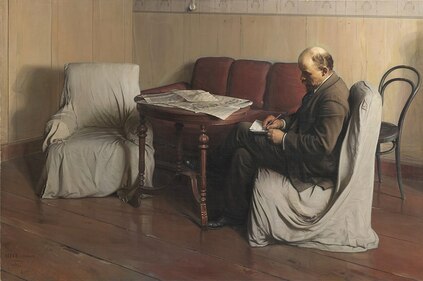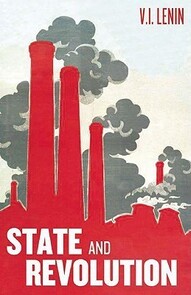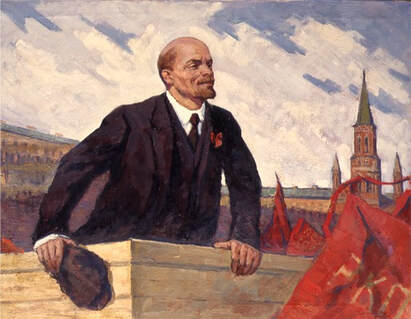|
7/23/2021 V. I. Lenin: State and Revolution — Commentary and Analysis. (12/12) By: Thomas RigginsRead NowChapter Six: “Vulgarisation of Marx by the Opportunists This chapter is a polemic against the "best known theoreticians of Marxism" namely Georgi Plekhanov (1856-1918) and Karl Kautsky (1857-1938) who were the leading thinkers of the Second International (1888-1914). Basically it is against Kautsky (13 pages)-- Plekhanov gets 1 page. Lenin thinks the collapse of the Second International was brought about by opportunism (abandoning the long term goals of the party for short term advantages) which was fostered by the evasion of discussion on the relation of the state to the social revolution and vice versa. This "evasion" has persisted to the present day. The well known A Dictionary of Marxist Thought (Second Edition) edited by Tom Bottomore, for example, has no entry on "opportunism" and does not even list it in the index. The entry on The State and Revolution does not even mention it. The chapter is divided into three sections: a short one contra Plekhanov and two long ones dealing with Kautsky. 1. Plekhanov's Polemic Against the Anarchists This section deals with Lenin’s critique of Plekhanov’s 1894 work Anarchism and Socialism. Lenin says in this work Plekhanov doesn’t even mention the most important issue between these two ‘isms’ — namely the nature of the state and the revolution’s relations to it. The work has two parts: the first, or historical part, Lenin approves of because it has useful information for the history of ideas, especially regarding Pierre-Joseph Proudhon (1809-1865) and Max Stirner (1806-1856). The second, or “literary” part Lenin calls “philistine.” This part is a “clumsy” attempt to equate anarchists with “bandits.” After the Paris Commune the anarchists had tried to claim that the commune and its history was a vindication of their views. Lenin of course rejects this claim and maintains that the true understanding of the meaning of the Commune is to be found in the writings of Marx and Engels, especially Marx’s Critique of the Gotha Programme. Neither the Anarchists, nor Plekhanov in his polemic, have grasped the main issue presented by the history of the Paris Commune i.e., “must the old state machinery be shattered, and what shall be put in its place.” By completely ignoring this issue Plekhanov, whether he knows it or not, has fallen into opportunism because opportunists want us to forget all about this question and not even discuss it all. It would seem that opportunism flourishes best where the working people are ignorant of Marxist theory and concentrate exclusively on short term goals and struggles. 2. Kautsky’s Polemic Against the Opportunists Lenin says the most important German opportunist was Bernstein whom Kautsky criticized in his first foray against opportunism: Bernstein und das sozialdemokratische Programm. Bernstein had charged Marxism with “Blanquism” [ Louis Auguste Blanqui, 1805-1881- advocated a coup by a small group who would then turn the government over to the people after they had instated socialism] in his great revisionist opus Voraussetzungen des Sozialismus. Bernstein particularly likes Marx’s conclusion (based on his study of the Paris Commune) that “the working class cannot lay hold of the ready-made state machinery, and wield it to its own purposes.” But he has his own interpretation of the meaning of Marx’s dictum which is exactly the opposite of what Marx intended. Marx meant, according to Lenin (following Engels), that the working class had to destroy the bourgeois state and replace it with a working class state. Bernstein says it means that the working class should cool it after the revolution and try and reform the state rather than getting carried away and trying to smash it. “A crasser and uglier perversion of Marx’s ideas cannot be imagined,” Lenin says. So, how did Kautsky deal with this crass opportunistic formulation in his critique of Bernstein? He glosses over it. Kautsky writes: “The solution of the problem of the proletarian dictatorship we can safely leave to the future.” Lenin says since opportunists want to defer to the future all talk about a working class revolution this is not a real critique of Bernstein but “ a concession to him.” Kautsky himself is thus an opportunist and, Lenin points out, as regards Marx’s understanding of how the workers should be educated with respect to a working class revolution and Kautsky’s understanding “there is an abyss.” In 1902 Kautsky wrote a more mature work, The Social Revolution. Lenin says there is a lot of valuable information in this work but the author still evaded the vital question of the state. Again, Kautsky ends up giving de facto support to the opportunists because he writes about the possibility of the working class taking state power without abolishing the currently existing state. This view, which derives from The Communist Manifesto of 1848 Marx had declared “obsolete” in 1872. Kautsky writes about democracy and that the working class will come to power and “realise the democratic programme” but he never mentions the lessons of the Paris Commune and the conclusions Marx and Engels drew from them that bourgeois democracy had to be replaced by working class democracy. Here is a quote from Kautsky: “It is obvious that we shall not attain power under the present order of things. Revolution itself presupposes a prolonged and far-reaching struggle which, as it proceeds, will change our present political and social structure.” While this is even too much for some present day “socialists” to stomach, Lenin thought it was as banal and obvious as “horses eat oats.” Lenin wanted this “far reaching struggle” spelled out so that working people would understand the difference between a working class revolution and the non working class revolutions of the past. Kautsky warns against opportunism in words, Lenin says, but actually promotes it in the way he expresses himself. Here is an example from The Social Revolution: “In a Socialist society there can exist side by side, the most varied forms of economic enterprises — bureaucratic trade union, trade union, co-operative, private…. There are, for instance, such enterprises that cannot do without a bureaucratic organization: such are the railways. Here democratic organisation might take the following form: the workers elect delegates, who form something in the nature of a parliament, and this parliament determines the conditions of work, and superintends the management of the bureaucratic apparatus. Other enterprises may be transferred to the labour unions, and still others may be organized on a co-operative basis.” Lenin says this quote is not only wrong-headed but is a backward step from the ideas Marx and Engels elaborated in the 1870s as a result of their study of the Paris Commune. Of course modern industrial production in general, not just railroads, needs to be conducted under rigid work rules and regulation but after the workers come to power they won’t be organized on bureaucratic lines overseen by “something like” the old bourgeois parliaments. There will be no bureaucrats as such. The workers will directly control their industries and delegates will be subject to instant recall, no one will earn more than ordinary workers, and the old state will be replaced by a new worker’s state where everyone will gain experience in administration and planning so that “bureaucrats” in the sense used by Kautsky will no longer exist. Kautsky has not paid attention to the words of Marx: “The Commune was to be a working, not a parliamentary body, executive and legislative at the same time.” Lenin next takes up Kautsky”s short work The Road to Power [ Der Weg zu Macht ]. Lenin thinks this is the best of Kautsky's writings against opportunism, yet it too is found wanting and for the same reason "it completely dodges the question of the state." It is this constant dodging that Lenin thinks weakened the German Social Democrats theoretically, led to the growth of opportunism, and ultimately to the great betrayal of socialist principles: the support of the German imperialists in the Great War. These three short works of Kautsky came out in 1899, 1902, and 1909 respectively but it was not until 1912 that Kautsky's opportunism became explicitly expressed. We will deal with this in t Kautsky's polemic against Pannekoek. 3. Kautsky's Polemic Against Pannekoek The Pannekoek in question was Anton Pannekoek (1873-1960) a Dutch Marxist who in later life became one of the leaders of "Council Communism" a tendency which developed out of the "Left Wing Communism" considered by Lenin to be an infantile disorder. However, long before this, in 1912, he published an article in Neue Zeit called "Mass Action and Revolution." In this article he criticized Karl Kautsky's views on the nature of the state in relation to the coming revolution. He pointed out that workers have to overthrow both the ruling class and their state. "The struggle will not end until, as its final result, the entire state organization is destroyed." Lenin says Pannekoek's article has defects, is imprecise, and not very concrete but is clear enough in advocating both the overthrow of the ruling class and the state that it controls replacing it with a working class state. But Lenin is really interested in Kautsky's reply which, he says, betrays Marxism on this issue -- i.e., the fate of the bourgeois state. Kautsky wrote: "Up till now the difference between Social Democrats and Anarchists has consisted in this: the former wished to conquer the state power while the latter wished to destroy it. Pannekoek wants to do both." Lenin says this distinction is a vulgar distortion of Marxism. Lenin was not always very subtle in his critiques. Pannekoek is the one who is correct, not Kautsky and for the following three reasons which differentiate Marxists (M) from Anarchists (A): 1. M- the state withers away after the revolution and the creation of Socialism: A- the state is abolished immediately and permanently after the revolution . 2. M- the state that withers away is the new form of the state. based on the Paris Commune, which the workers create after the revolution to replace the bourgeois state: A- the old state is abolished and nothing is put in its place to direct and channel the newly won power of the working class-- the dictatorship of the proletariat (the necessary first form of worker's power after the fall of the working class) is rejected. 3. M- use the currently existing state (as far as is possible) to educate and train the working people for revolutionary activity: A- reject this notion. Lenin also objects to Kautsky taking quotes out of context from Marx and using them against Pannekoek when they are not at all germane to the argument (a fate all too soon to befall quotes from Lenin himself). Kautsky talks about the party being in opposition to the capitalist state now and wants to put off discussions about the nature of the state until after the workers come to power. He doesn’t want to talk about the nature of the revolution— which is one of the main features of opportunism. It’'s all well and good to make general comments about opposition and democratic struggle but we must always be clear about how this struggle must eventuate. “A revolution must not consist in a new class ruling, governing with the help of the old state machinery, but in this class smashing this machinery and ruling, governing by means of new machinery.” Kautsky ignores this because he maintains there must be officials and experts just as much after the change of power as before. Lenin agrees but insists, based on the lessons of the Commune, that the officials and experts will be under the direction of the working class and not be responsible to the bureaucratic structures of the old capitalist state which is kept around and is supposedly supervised by the working class. Capitalism has enslaved the working people and bourgeois democracy, which we may now live under, is, Lenin says, crushed and mutilated by the wages system, poverty and “the misery of the masses.” This fake mutilated pseudo-democracy is the reason why, in our day the Tea Party had such influence and Trump was able to take over the Republican party and control many levers of power in the US. And, Lenin says, it is the source of corruption in the political parties and the trade unions, and fuels the tendency for the “leaders” of the people to turn into bureaucrats— “i.e., privileged persons detached from the masses, and standing above the masses.” This is just the nature of democracy under capitalism and until capitalism is overthrown even the leaders of the working people “will inevitably be to some extent ‘bureaucratized.’” In attacking Pannekoek, Lenin says, Kautsky is only repeating the views of Bernstein (“the ‘old’ views”) as expressed in Evolutionary Socialism, the English name of Bernstein’s book. Bernstein had rejected many of Marx’'s positions concerning worker's democracy versus bourgeois democracy based on the idea that after 70 years or so “in complete freedom” the British union movement had given up on the ideas as “worthless” and had settled on a model based on bureaucracy and regular parliamentary practice. As against this Bernstein-Kautsky assertion Lenin says it is not the case that the British unions have developed “in complete freedom,” but they had rather developed in an atmosphere of “complete capitalist enslavement.” Of course, in such an atmosphere, it made no sense to try to create a working class democracy along Marxist lines that had presumed a post- revolutionary environment in which the working class was the new ruling class. The two great errors we must avoid are: First, thinking we have to just take over the presently existing state machinery by means democratic elections or parliamentary procedures and then employe it to build socialism, and Second, to take the Anarchist position of just smashing the presently existing state and then letting the working people decide what happens next (i.e., no pre-planning for a temporary worker’s state until conditions of socialism are firmly established.) The Anarchist view is not really taken very seriously within the working class, but Kautsky’s view (or some modern day descendent ) still has its supposititious appeal. Lenin quotes Kautsky: “never, under any conditions can it [a working class victory] lead to the destruction of the state power; it can lead only to a certain shifting of forces within the state power.... The aim of our political struggle then, remains as before, the conquest of state power by means of gaining a majority in parliament and a conversion of parliament into the master of the government.”'' Lenin says this is an example of “vulgar opportunism” i.e., of abandoning the principles of Marxism and the real long term interests of the working people and tailoring your program to take ephemeral advantages of historically temporary social and economic conditions. It is a confusion between strategy [the what, the goal, the end result, socialism] and tactics [the how, what must be done, the present step in the democratic struggle]. Of course in the present day and in the non revolutionary conditions temporally instantiated in the US and most of Europe there is no sense in calling for the destruction of bourgeois democracy, of coining a lot of "revolutionary" slogans about the dictatorship of the proletariat, of the revolutionary overthrow of the capitalists by the armed workers, etc. "To every thing there is a season, and a time to every purpose under the heaven." Our current struggle is to defeat the ultra-right politically and work with progressive groups and others to build a meaningful coalition of forces able to protect already existing democratic rights and to extend them, and fight for new ones, for the benefit of the working people and their allies. Nevertheless, in the realm of theory we should not forget the ultimate destiny of the capitalist system and become so blinded by the present transient stage in history that we become as those "socialists," condemned by Lenin, who rejected the dictatorship of the proletariat in theory because it "contradicted" democracy. Lenin thought that ridiculous; it contradicted only the pseudo-democracy used by the ruling class to befool the workers, and of those so-called "socialists” ; he said there "is really no essential difference between them and the petty-bourgeois democrats." This may have no sting today, but it may in the nearer than we think, future. State and Revolution ends here and chapter seven, the last ("Experience of the Russian Revolutions of 1905 and 1917") was never written. The October Revolution broke out and Lenin wrote: "It is more pleasant and useful to go through the 'experience of the revolution' than to write about it." I hope people will find this commentary useful. New York, January 31, 2015. Updated for MWM 2021 AuthorThomas Riggins is a retired philosophy teacher (NYU, The New School of Social Research, among others) who received a PhD from the CUNY Graduate Center (1983). He has been active in the civil rights and peace movements since the 1960s when he was chairman of the Young People's Socialist League at Florida State University and also worked for CORE in voter registration in north Florida (Leon County). He has written for many online publications such as People's World and Political Affairs where he was an associate editor. He also served on the board of the Bertrand Russell Society and was president of the Corliss Lamont chapter in New York City of the American Humanist Association.
1 Comment
Andres
9/17/2021 10:02:21 am
Great!!
Reply
Leave a Reply. |



 RSS Feed
RSS Feed